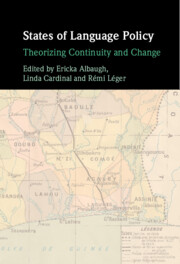Book contents
- States of Language Policy
- States of Language Policy
- Copyright page
- Contents
- Figures
- Tables
- Contributors
- Acknowledgments
- Introduction
- Part I Routes of Change
- Part II Dependent Relationships
- 7 African State Traditions and Language Regimes
- 8 Algeria’s Language Regime
- 9 Language Politics in India
- 10 Lost in Traditions? Continuity and Change in Hong Kong’s Language Regime
- Part III Levels of Governance
- Conclusion
- Index
- References
7 - African State Traditions and Language Regimes
from Part II - Dependent Relationships
Published online by Cambridge University Press: 14 November 2024
- States of Language Policy
- States of Language Policy
- Copyright page
- Contents
- Figures
- Tables
- Contributors
- Acknowledgments
- Introduction
- Part I Routes of Change
- Part II Dependent Relationships
- 7 African State Traditions and Language Regimes
- 8 Algeria’s Language Regime
- 9 Language Politics in India
- 10 Lost in Traditions? Continuity and Change in Hong Kong’s Language Regime
- Part III Levels of Governance
- Conclusion
- Index
- References
Summary
How does one speak of “African” state traditions, when they have been so deeply marked by outside intervention? Colonial traditions informed virtually all independent African states’ language policies. This chapter expands the STLR framework to postcolonial Africa, suggesting that continent-wide traditions include states oriented outwardly, with minimal accountability to citizens, whose populations are treated as possessing fixed linguistic identities. Beneath these macro traditions are more divergent paths deriving from historical and institutional differences, namely experiences with varying types of colonial rule and construction as either federal or unitary states. This chapter explores the case of Burkina Faso, which displays both the continent-wide traditions as well as a francophone, unitary path, situating it within an analysis of language regimes across Africa. It juxtaposes the constraints of tradition with the critical juncture and policy feedback that produced change across Africa in the last few decades. Finally, it argues that Africa’s language regimes will likely not fit comfortably into existing monolingual or fixed multilingual templates, since they are interacting with precolonial traditions. Rather, the policies that emerge will reflect people’s evolving language use, particularly relating to African lingua francas.
- Type
- Chapter
- Information
- States of Language PolicyTheorizing Continuity and Change, pp. 127 - 149Publisher: Cambridge University PressPrint publication year: 2024

